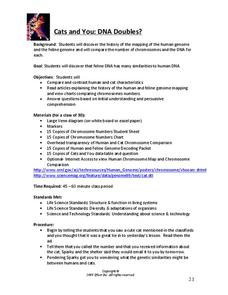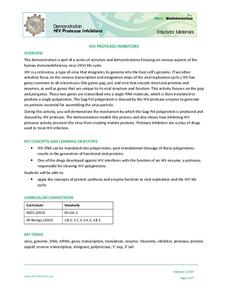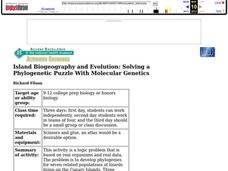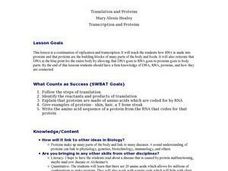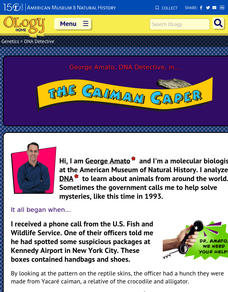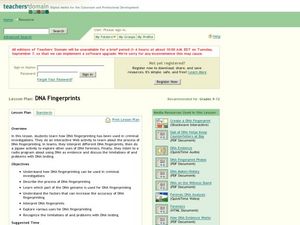Curated OER
From Restriction Maps to Cladograms
Biology aces analyze restriction maps to determine the relationships among different primate species and then complete a cladogram. Preface this lesson with an explanation of how restriction enzymes are used to create the DNA maps....
Curated OER
Genetic Challenge Worksheet
In this genetics worksheet, students describe how to tell the difference between DNA, RNA, and proteins. Students also learn about the processes of transcription and translation. This worksheet has 3 short answer and 3 fill in the blank...
Curated OER
Genetics - The Study of Inheritance
For this genetics worksheet, students will compare four pea plants with different alleles that control flower color and complete 5 short answer questions. Then students will read 8 statements about genetic mutations and determine if the...
Howard Hughes Medical Institute
Using DNA to Trace Human Migration
Can scientists trace all humans back to a small region in Africa? An intriguing lesson turns back time to reveal artifacts leading scientists to believe human life originated in Africa and dispersed from there.
Beyond Benign
Cats and You: DNA Doubles?
What do cats and human DNA have in common? The second instructional activity of a series focuses on the mapping of mammal genomes. Scholars learn about the structure of DNA as they compare the chromosomes of humans and felines.
A Mighty Girl
Rosalind Franklin
Rosalind Franklin, the Dark Lady of Science, is featured in an intriguing poster that is sure to inspire young scientists.
Howard Hughes Medical Institute
HIV Protease Inhibitors
How do doctors fight a virus that's constantly mutating? Show science scholars how we fight HIV using one of its own most fundamental processes through a thoughtful demonstration. The lesson focuses on how protease inhibitors prevent HIV...
Curated OER
Island Biogeography and Evolution
High schoolers use this activity as a logic problem that is based on real organisms and real data. The problem is to develop phylogenies for seven related populations of lizards living on the Canary Islands. Three phylogenetic charts...
Curated OER
Happy Face Spider Propagation
Young scholars research genetic adaptations. In this chromosome lesson, students investigate dominant and recessive genes using spiders indigenous to Hawaii. Young scholars create Punnett squares to determine the probability of passing...
Curated OER
Codon Bingo
Young scholars participate in a stimulating game that involves deciphering the genetic code. They practice transcription and translation of codons while playing the game.
Curated OER
Genetic Engineering
Students discuss the risks and benefits associated with biotechnology. In this biotechnology lesson, students discuss the role of genes in the body and brainstorm ethical issues relating to biotechnology. They read about an ethical issue...
Curated OER
Genetics and Molecular Biology
Students create DNA models using colored construction papers. In this biology lesson, students identify enzyme restriction sites. They model how DNA plasmids replicate when taken up by a bacterial cell.
Curated OER
The Genetics of Antibody Diversity
Students distinguish between the light and heavy chain sections. In this biology lesson, students simulate the DNA splicing process. They calculate antibody diversity using the information given.
Curated OER
Taster or Non-Taster?
Students conduct a simple experiment to determine if a trait has been passed from a family member to them.
Curated OER
Translation and Proteins
Learners follow the steps of translation and identify the reactants and products of translation. They able to explain that proteins are made of amino acids which are coded for by RNA. Students are able to give examples of proteins--...
Howard Hughes Medical Institute
Natural Selection and Evolution of Rock Pocket Mouse Populations
Can evolution repeat itself? Scholars analyze amino acid data in two separate populations of mice. They learn that evolution repeats itself, but natural selection prefers some mutations over others in different environments. Analysis...
American Museum of Natural History
DNA Detective
Match up the DNA code. Pupils read the website from the American Museum of Natural History about how DNA can determine whether a skin is from a particular type of reptile. Using the same technique, learners match up products with the...
Biology Junction
Nucleic Acids
In this DNA instructional activity, students identify the different parts of the DNA and color them. They complete 16 short answer and fill in the blank questions on DNA.
Curated OER
Inheritance Patterns in Zorks
In this inheritance patterns instructional activity, learners create a visual of a Zork using chromosome strips to represent alleles from the father and the mother to determine the traits in the offspring. Students translate the genotype...
Curated OER
DNA Fingerprints
High schoolers interpret different DNA fingerprints, then do a jigsaw activity to explore other uses of DNA forensics. They listen to a radio program about using DNA as evidence and discuss the limitations of and problems with DNA testing.
Curated OER
Reaching Into Your Genes
Students interact with a video to explore the basis for the science of chromosomes. They perform a chromosomal analysis called a karyotype and explore how seemingly minute errors in chromosomes can lead to devastating illnesses.
Curated OER
DNA-B-C's
Students review what they already know about DNA. After reading an article, they discover a new technique to map the course of evolution. In groups, they create ways to present this material to younger children and research DNA's uses.
Curated OER
Family Pedigrees
Students work as a class to first construct a pedigree of a popular singer, showcasing the singing gene being passed down through the generations. Students then make their own family pedigree and follow two traits through their family...
Curated OER
The Watson-Crick Model of DNA Structure
Junior geneticists construct models of DNA to discover sequencing and pairing of nucleotides. They use the models to simulate protein synthesis and then translate the codes into physical traits. Finally, they use the traits to create a...
Other popular searches
- Cracking the Genetic Code
- Using the Genetic Code
- Genetic Code Proteins
- Genetic Code Sequencing
- Middle School, Genetic Code
- Middle School Genetic Code
- Genetic Code Worksheets
- The Genetic Code






